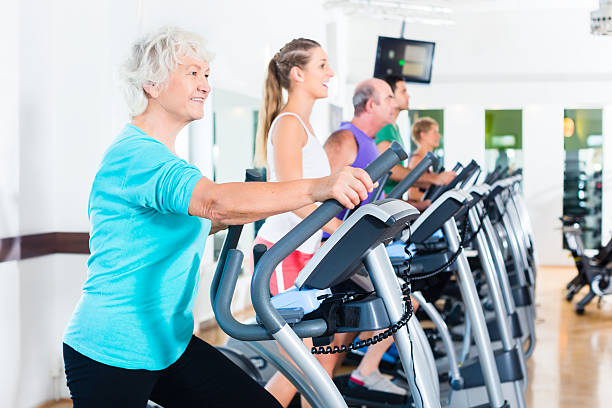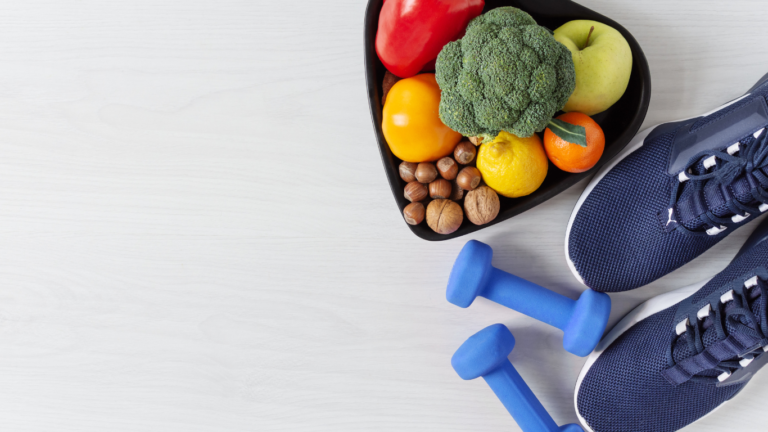
Group with young and Senior women and men on elliptical trainer exercising in gym
Cardio King: Mastering the Art of Cardiovascular Fitness
Cardiovascular fitness, often referred to as “cardio,” is a cornerstone of overall health and well-being. Becoming a “Cardio King” signifies mastering the art of cardiovascular fitness, a journey that involves the heart, lungs, and muscles working together efficiently to deliver oxygen-rich blood to your body’s tissues. In this comprehensive guide, we will explore the importance of cardiovascular fitness, its numerous benefits, and the strategies for mastering this vital aspect of your health and fitness journey.
Understanding Cardiovascular Fitness
Cardiovascular fitness is a measure of how well your heart, lungs, and circulatory system work together to transport oxygen throughout your body during physical activity. It is a key component of physical fitness, alongside strength and flexibility. Cardiovascular fitness encompasses the following aspects:
1. Heart Health:
A strong cardiovascular system ensures that your heart can efficiently pump blood to deliver oxygen to your body’s tissues. It reduces the risk of heart diseases and conditions.
2. Lung Efficiency:
Good cardiovascular fitness enhances lung function, allowing for efficient oxygen intake and carbon dioxide removal during exercise.
3. Energy Levels:
Improved cardiovascular fitness leads to increased energy levels, making everyday activities easier to perform.
4. Weight Management:
Regular cardiovascular exercise is effective for burning calories, aiding in weight loss or weight maintenance.
5. Mental Health:
Cardiovascular exercise releases endorphins, which are known as “feel-good” hormones. This can alleviate stress, anxiety, and depression, promoting mental well-being.
Benefits of Cardiovascular Fitness
Mastering the art of cardiovascular fitness offers a multitude of benefits that extend beyond physical health. These advantages include:
1. Enhanced Heart Health:
Regular cardiovascular exercise strengthens the heart, reducing the risk of heart diseases, such as coronary artery disease and hypertension.
2. Improved Endurance:
Cardiovascular fitness increases your stamina, enabling you to perform physical tasks with less fatigue.
3. Weight Management:
Engaging in cardiovascular exercise aids in weight loss or weight maintenance by burning calories and increasing metabolism.
4. Better Lung Function:
Cardio workouts enhance lung capacity and function, improving oxygen uptake and carbon dioxide elimination.
5. Stress Reduction:
Cardiovascular exercise triggers the release of endorphins, which alleviate stress and improve mood.
6. Enhanced Mental Clarity:
Improved blood flow to the brain results in better cognitive function and memory.
7. Increased Longevity:
Studies suggest that individuals with high cardiovascular fitness levels tend to live longer and experience fewer age-related health issues.
8. Disease Prevention:
Cardiovascular fitness helps reduce the risk of various chronic conditions, such as type 2 diabetes and certain cancers.
Strategies for Mastering Cardiovascular Fitness
Now that we understand the importance and benefits of cardiovascular fitness, let’s explore strategies for becoming a Cardio King:
1. Choose Cardio Activities You Enjoy
Cardiovascular exercise should be enjoyable, not a chore. Select activities you genuinely like, whether it’s jogging, cycling, swimming, dancing, or playing sports. The more you enjoy the activity, the more likely you are to make it a consistent part of your routine.
2. Gradually Increase Intensity
If you’re new to cardiovascular fitness, start slowly and gradually increase the intensity of your workouts. This approach minimizes the risk of injury and allows your body to adapt to the demands of exercise.
3. Set Realistic Goals
Establish clear and achievable goals for your cardiovascular fitness. Whether you aim to run a certain distance, cycle for a specific duration, or participate in a charity walk, having goals provides motivation and purpose for your workouts.
4. Consistency Is Key
To master cardiovascular fitness, consistency is essential. Aim to engage in cardiovascular exercise at least three to five times a week, with sessions lasting 30 minutes or more. The key is to build the habit of regular exercise.
5. Include Variety
Incorporate variety into your cardiovascular fitness routine. Change your activities or try different workout programs to prevent boredom and engage different muscle groups. Cross-training, such as combining running with swimming or cycling, can be highly effective.
6. Monitor Your Heart Rate
Monitoring your heart rate during exercise can help ensure you’re working within your target heart rate zone. This zone optimizes cardiovascular fitness gains and minimizes the risk of overexertion. You can use a heart rate monitor or take your pulse manually.
7. Warm-Up and Cool Down
Always warm up before your cardio workouts to prepare your body for exercise and reduce the risk of injury. After your workout, engage in a cool-down routine to gradually lower your heart rate and stretch your muscles.
8. Incorporate High-Intensity Interval Training (HIIT)
HIIT workouts involve short bursts of intense exercise followed by periods of low-intensity recovery. HIIT is known for its efficiency in improving cardiovascular fitness and burning calories.
9. Set Personal Records
Occasionally, challenge yourself to set personal records, such as achieving your fastest 5K time or cycling the most miles in a single ride. Competing against yourself can be highly motivating.
10. Listen to Your Body
Pay attention to your body’s signals during your cardio workouts. If you experience pain, dizziness, or extreme fatigue, it’s essential to stop exercising and seek medical advice if necessary.
11. Nutrition for Cardiovascular Fitness
Proper nutrition plays a vital role in cardiovascular fitness. To support your exercise regimen:
Stay Hydrated:
Drink an adequate amount of water before, during, and after exercise to maintain proper hydration.
Fuel Up
: Consume a balanced meal with carbohydrates and protein 2-3 hours before your workout. After exercise, opt for a mix of carbohydrates and protein to aid in recovery.
Healthy Fats:
Include healthy fats, such as avocados, nuts, and olive oil, in your diet to support overall health.
Antioxidant-Rich Foods:
Antioxidant-rich foods like berries and leafy greens can protect your cardiovascular system from oxidative stress.
12. Rest and Recovery
Ensure you get enough rest and allow your body to recover after challenging cardio workouts. Adequate sleep and rest days are crucial for muscle repair and overall well-being.
13. Consult a Fitness Professional
If you’re new to cardiovascular fitness or have specific goals or health concerns, consider consulting a fitness professional or personal trainer. They can provide guidance, create a tailored workout plan, and ensure you’re exercising safely and effectively.
In Conclusion
Becoming a Cardio King and mastering the art of cardiovascular fitness is a journey that offers numerous health and well-being benefits. It involves choosing enjoyable activities, setting realistic goals, maintaining consistency, monitoring your heart rate, and incorporating variety into your workouts. Proper nutrition and adequate rest are also essential components of cardiovascular fitness. By embracing these strategies and committing to regular exercise, you can strengthen your heart, improve your lung capacity, enhance your overall health, and become a true Cardio King. Remember that cardiovascular fitness is not just about physical health; it’s a journey that can improve your mental well-being and contribute to a longer, healthier life.




